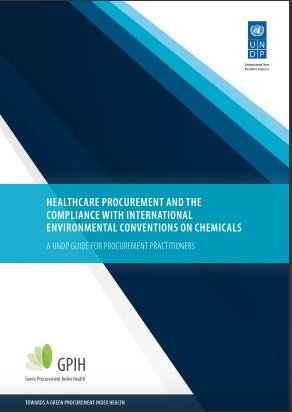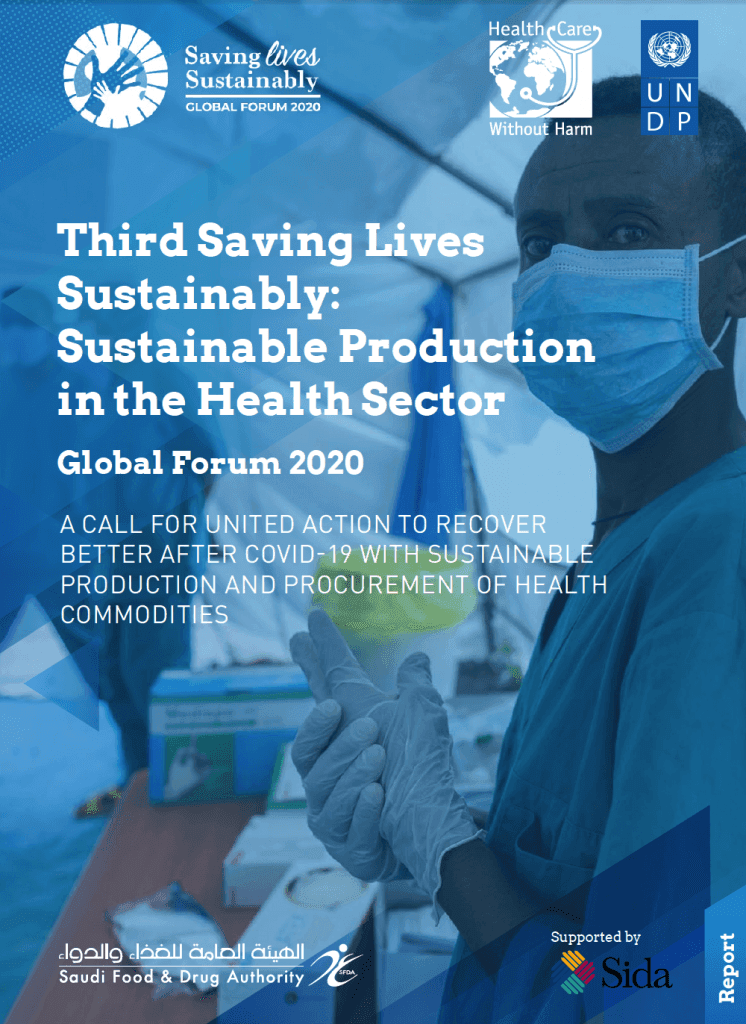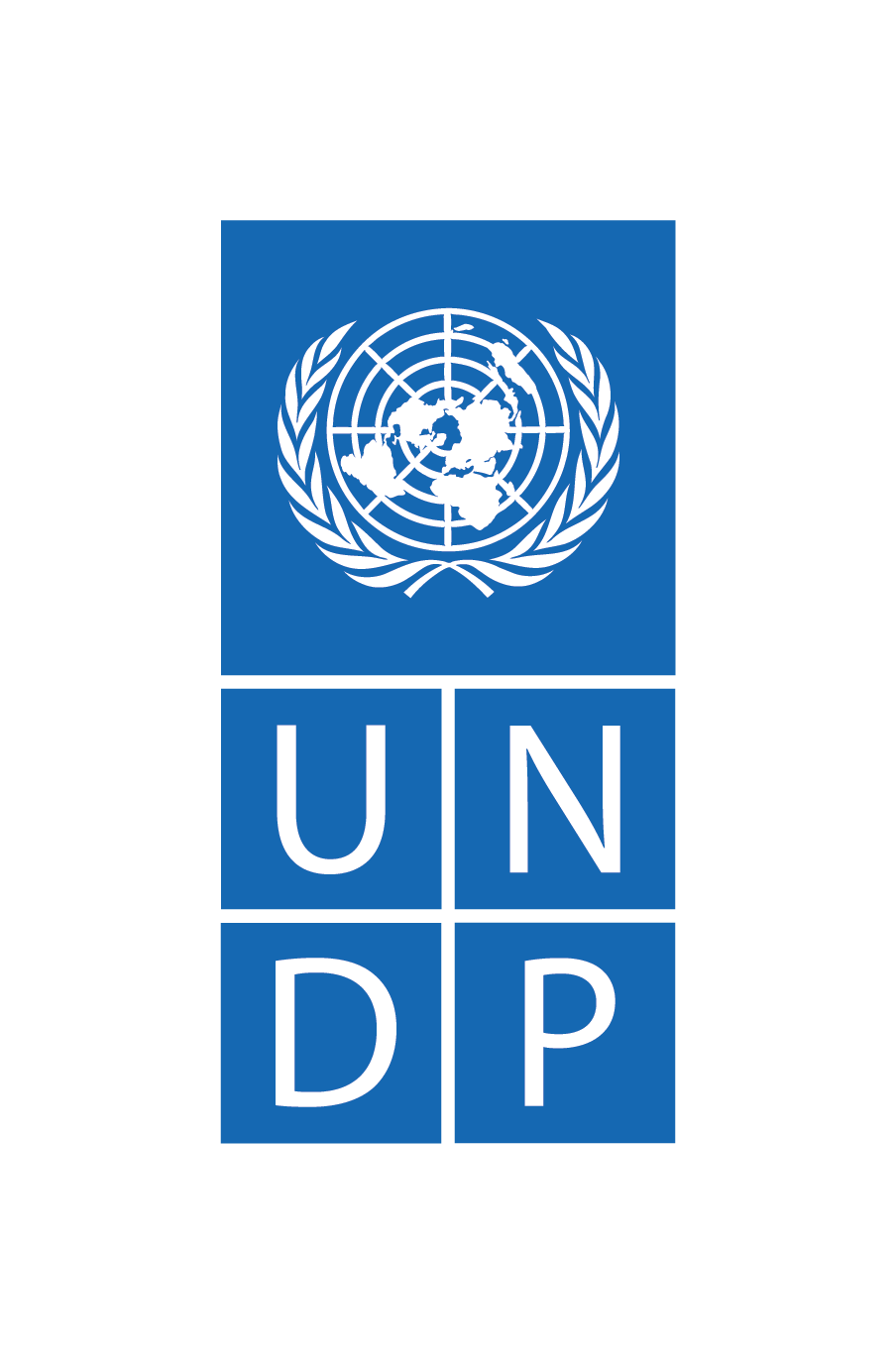UNDP’s approach to sustainable procurement for health products
In close collaboration with governments, United Nations agencies, international organizations, manufacturers, freight forwarders and partners, UNDP is adopting incremental measures and models in its health procurement practices to minimize environmental impact and to incorporate economic and social sustainability. Key partnerships and priority programme areas are outlined below.
UNDP sustainable procurement in the health sector programme
UNDP hosts the secretariat and participates in the United Nations Informal Interagency Task Team on Sustainable Procurement in the Health Sector (SPHS). The taskforce brings together seven United Nations agencies (UNDP, United Nations Environment Programme – UNEP, United Nations Children’s Fund – UNICEF, United Nations Population Fund – UNFPA, United Nations High Commissioner for Refugees – UNHCR, United Nations Office for Project Services – UNOPS, World Health Organization – WHO) and three multilateral health financing institutions (Gavi, the Vaccine Alliance – Gavi, Global Fund to Fight AIDS, Tuberculosis and Malaria – Global Fund, Unitaid). The annual cumulative purchasing power of the taskforce for health products is around $5 billion, which gives opportunities to influence and pilot business models for improving environmental, social and economic sustainability. With increased health spending during the pandemic, this figure has risen two-fold in the last 2 years.

UNDP’s Sustainable Health Procurement programme strives to promote sustainable production and consumption practices by ensuring products and services purchased have the lowest environmental impact and contribute towards positive social results. The UNDP approach to sustainable health procurement also leads towards considerable cost benefits and resource efficiencies in health procurement.
UNDP is committed to sustainable procurement as a gradual approach through working in partnership with manufacturers and other partners and by strategically leveraging the health procurement architecture as a market mechanism for change. This will foster a market transition towards more sustainable production, procurement and consumption practices for health products. Among many others, UNDP has organized five Global manufacturers fora in five different regions (Philippines 2018, Tanzania 2019, Saud Arabia 2020, Colombia 2021 and United Kingdom 2022). The Global manufacturers forum has become a popular event for policy makers, manufacturers, academia, CSOs and suppliers of health commodities and equipment to gather and share expectations, lessons and feedback.
In 2020, UNDP launched the Sustainable Health Procurement Guidance Note, as part of the Sustainable Health in Procurement Project, and has been developing different approaches to include sustainability in its health procurement practices. The main strategy comprise: optimizing medicines packaging; reducing CO2 emissions by optimizing health product procurement transport scenarios; and influencing suppliers in long-term agreements with UNDP to introduce sustainability in their business models through the monitoring and review of sustainability criteria. These sustainability approaches to procurement are carried out closely with national counterparts; the work at the country level serves as a basis for countries to start embedding sustainable practices in their own procurement activities.
Additionally, UNDP worked with Healthcare Without Harm to develop and launch the chemicals of concern to health and environment guidance document. This document includes a list of chemicals of concern to human health and the environment. The list is based on systematic evidence reviews from authoritative sources, which identify chemical and material hazards of concern that are carcinogenic, mutagenic, endocrine disrupting and reproductive hazards (health hazards) and bio- accumulative and persistent to the environment and/or listed in International Environmental instruments (Conventions)
Pharmaceutical packaging optimization
Rethinking the necessities of packaging helps to reduce waste, optimize shipments and save costs which can be reinvested in health activities and in strengthening national supply chains.
UNDP is engaged in packaging optimization of health products and further investigating areas for innovation of product waste management. The packaging reduction project is conducted in partnership with manufacturers and freight forwarders to identify areas of opportunity, redesign packaging specifications and to calculate metrics to measure the impacts through capacity enhancement, reduced emissions and cost savings achieved.
UNDP has worked extensively with antiretroviral manufacturers and national regulatory authorities on packaging optimization to reduce product waste and increase cost-effectiveness. In 2016-2017, it piloted a Reduced Packaging Initiative piloted in Zimbabwe, South Sudan, and Equatorial Guinea. The new packaging resulted in a 55 per cent increase in shipping capacity per container and an additional reduction of 57 per cent of CO2 per unit for the Zimbabwe trade lane. Up to US$1.20 million in savings have been generated for 2.5 million packs delivered under the UNDP Reduced Packaging Initiative. Work is ongoing to extend this approach to other countries and to a wider range of antiretrovirals procured through UNDP. This entails substantive work with national regulatory authorities to ensure compliance with labelling requirements.
With increased experience and lessons learned on medicines packaging optimization, UNDP’s approach can be adapted and replicated by national procurement systems and by other players involved in health procurement.
CO2 emissions reporting and reduction
Monitoring, measuring, reporting health product transport’s CO2 footprints and rethinking procurement planning and transport help reduce environmental impact and gain cost efficiencies.
UNDP is committed to reducing its CO2 footprint, including the CO2 footprint of health procurement to reduce the impact of climate change. Since 2015, UNDP has been collecting CO2 data as part of long-term agreements with specified antiretrovirals first line suppliers to measure, monitor and reduce CO2 impacts in partnership with freight forwarders. All collected data is captured as business intelligence analytics and visualized through a dashboard that is monitored on a quarterly basis. The UNDP procurement planning capacity engagement and data provided by UNDP country offices is also used to switch to more efficient freight options that provide reduced emissions per shipment, resulting in significant CO2 reductions and freight cost savings.

Environmental and social sustainability scorecard initiative and call-off criteria for tendering
Leveraging its global health procurement architecture, UNDP’s environmental and social sustainability initiative incrementally builds a dialogue and a demand for sustainable pharmaceutical production and procurement.
UNDP is committed to working in partnership with manufacturers to meet demand for better social and environmental due diligence in pharmaceutical manufacturing and procurement. The UNDP environmental and social sustainability scorecard initiative leverages the UNDP health procurement architecture within its signed long-term agreements and contract management process. By strategically selecting health products of high volumes, this approach encourages manufacturers to follow sustainability manufacturing criteria under the UNDP Sustainable Health Procurement Programme, as part of the ongoing procurement contracts.
UNDP has designed an environmental and social sustainability scorecard initiative, which, as specified within the suppliers’ contract, requires manufacturers to provide comprehensive information, data and supporting documentation about manufacturing facilities.
The information is compiled in a UNDP sustainability scorecard and is regularly reviewed to identify opportunities to include environmental sustainability within pharmaceutical manufacturing facilities and processes. Through the collection of relevant data on suppliers’ environmental practices, it is possible to establish and monitor the baseline of adopted environmental criteria. A continuous two-way dialogue is opened with manufacturers to discuss challenges and potential for improvements in pharmaceuticals manufacturing, therefore setting incremental industry best practices.
Sustainable Health in Procurement Project (SHiPP)
UNDP together with Health Care Without Harm (HCWH) implemented the Sustainable Health in Procurement Project (SHiPP). The first phase of the project addressed the intersection between health, human rights and the environment in 10 countries (Argentina, Brazil, China, India, Moldova, South Africa, Tanzania, Ukraine, Vietnam and Zambia). SHiPP was designed to promote procurement practices that consider environmental and social impacts, as well as cost-efficiency and affordability when defining how processes can be sustainable, and to mainstream gender and human rights including anti-corruption, transparency and accountability.
Through the SHiPP, countries have adopted new standards and guidelines to promote sustainability in the health sector. For instance, Brazil has developed a plan to ban mercury medical devices; India has established guidelines and criteria for Bio-Medical Waste and Infection Control Management; and South Africa approved an acquisition plan for biogases and air quality monitoring.
Impact Stories that Inspire
SHiPP amplifies the voices of incredible and extraordinary women and men passionate about introducing health sector practices that improve their working conditions, the lives of their communities and help protect the environment.
Nearly 60 million health workers worldwide deliver care and services to patients either directly as doctors and nurses or indirectly as aides, helpers, laboratory technicians and medical waste handlers. These individuals are our most valuable resource for health, and many of them are now leading the way to a more sustainable future by taking care of people in their communities and the environment.
In this unique collection of stories, you will hear directly from inspiring individuals who work in the eld and push the limits of their societies and systems to move health care to a more sustainable development trajectory.
You will read a story about two Zambian women who challenged societal stereotypes and prejudices by training to become autoclave operators. These women contribute to safer waste management practices in a job traditionally perceived as a male domain.
You will hear from a nurse in Brazil whose charisma and leadership were catalytic to the adoption of new, environmentally friendly cleaning products. Initially reluctant to make those changes, the Minas Gerais state has found that the introduction of more sustainable products has dramatically improved their citizens’ health.
You also will read about an Indonesian team that cultivated a small-scale organic farm during the COVID-19 together with the support of rehabilitating mental health patients and the local community.
Impact Stories that Inspire features voices from all over the world. Stories show that no matter our role in society, we all have a vital part in creating a better, safer, and more resilient world.
Key resources

Environmental Questionnaire for UNDP Suppliers and Manufacturers of Healthcare Products
United Nations Development Programme, Health Care Without Harm, Green Procurement Index Health
As part of the engagement on sustainable health procurement, UNDP has developed a questionnaire on environmental practices of suppliers. The questionnaires help to collect data to be used to define baselines of suppliers’ environmental practices, but also to define realistic criteria for environmental practices that can be included in tenders to promote the selection of suppliers with sustainable environmental practices. The questionnaire is meant to inform and support capacity-building to transition to an environmentally respectful manufacturing.
Website

United Nations Development Programme, Green Procurement Index Health
UNDP has developed a guide for procurement practitioners to monitor and evaluate compliance with international conventions for environmental safeguarding.
Website
For additional information on SPHS and UNDP work on sustainable procurement, the following reading is proposed:

SHiPP Annual Report 2021
Health Care Without Harm, UNDP
PDF

Report: Third Saving Lives Sustainably: Sustainable Production in the Health Sector
Global Forum, , Health Care Without Harm, United Nations Development Programme
PDF

Global Road Map for Health Care Decarbonization
Health Care Without Harm
This is the second in a series of research and policy papers that Health Care Without Harm and Arup have produced together to identify a set of actions the health sector can take to align itself with the ambition of the Paris Agreement while simultaneously achieving global health goals.
PDF



